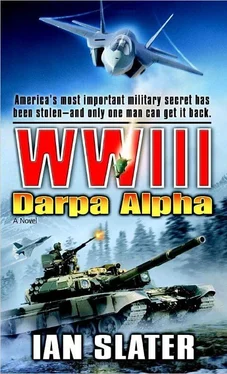For a second Margaret hesitated. Was it Aussie Lewis? she wondered. Was it code? “To whom would you like to speak?”
“What — is this the Dim Sum Restaurant?”
By then Douglas was on the line. “ No ,” he said emphatically. “You’ve got the wrong number.”
There was a click and the hum of the line.
“What a rude person,” said Margaret. “The least he could have done was apologize.”
“Is Dim Sum open twenty-four hours?” asked Douglas.
“Yes. I think our number must be very similar. Why, is there something wrong?”
“No,” said Douglas tentatively, thinking it over, then more assertively, “No. But this whole business about the terrorists, I mean, puts you on edge.”
Margaret concurred. “Everyone’s on edge. Have been since we found out our own government has been listening in on all our calls.”
When the phone rang two minutes later, Douglas took it. It was a Pentagon operator, presumably the same one who had called Margaret. She apologized to the general, but the CNO had been delayed. He would be calling shortly, however. Douglas said that was fine and thanked her for calling. He put the phone down.
“Godammit! He’s delayed!”
Margaret could see that he was worried that the delay might mean he was out of the running.
“Don’t fret,” she told him.
Freeman nodded amicably. “You’re right. You know why?” Before she could answer, he told her, “It’s because I still have that intuition. This is no courtesy call at—” He glanced at his watch. “—0330.”
“You’re right,” Margaret said, “unless the chief of naval operations wants to order takeout!”
They both laughed. Margaret decided she’d now have a cup of Evening Star herbal tea. It was said to calm the nerves, creating an ambience of tranquility, an ambience that was shattered by the shrill ring of the kitchen phone. Not wishing to seem too eager, Freeman hesitated for a moment as he took the receiver from his wife, giving her a wink and a smile. She was pleased. He was ready. How often had he told her that luck is no more than being packed, ready to act on a moment’s notice?
“General!” The drawl of hard consonants was unmistakable.
“Aussie?”
“The one and only, General. Sorry for calling so early but I wanted to give you a heads-up before the media get to you.”
“Well, mate,” replied Freeman, “you’re a bit late. They’ve parked outside — en masse.”
“So you’ve heard already?”
“Heard what?” Freeman asked impatiently.
“The scumbags,” said Aussie. “They’ve bought it.”
Margaret was straining to hear what Aussie was saying, her face muscles tightening as she tried to make sense of it. Douglas, she saw, looked stricken.
“Where?” Freeman asked Aussie.
“On the Canadian side. Apparently the RCMP were called. Funny thing, though — I mean funny peculiar, not funny ha-ha — was that it was a coupla civilians who tipped the Mounties.”
For Freeman the image of a scarlet-tuniced Mountie with the distinctive peaked hat, brown leather riding boots, and yellow-striped riding britches leapt to mind, even though the general knew that this was the ceremonial garb of the Royal Canadian Mounted Police and not the more utilitarian khaki, yellow-banded cap, and yellow-striped navy trousers that constituted the workaday uniform of Canada’s famed federal police.
“A firefight?” he asked Aussie.
“No,” Aussie replied. “Not a shot fired from what I was told. They went off the road into a great bloody ravine, snowing like crazy.”
“Who told you this, dammit?” pressed Freeman, who was anxiously awaiting the CNO’s call and growing more tense by the second with the knowledge that because Margaret had declined to pay extra for call waiting, the CNO was probably trying to get through right now.
“Mate o’ mine in our Mountain Division told me,” Aussie explained. “Gave me a bell.”
“Bell” was British and Aussie slang for someone phoning you. Freeman was struck anew by how cellphone communication had revolutionized life. In this case it had allowed Aussie Lewis’s buddy in the field to effortlessly transmit the news before official channels.
“So you’re telling me,” said the general, “that the terrorists are confirmed dead?”
“Yeah. Thought I’d give you a bell before Marte Price and the jackals hit you with it out of the blue.”
“Can you call your buddy back and get more details?”
“I tried, General — knew you’d want more info, but I can’t reach the bugger.” Aussie momentarily lost his accent as he affected the neutral tone of the ubiquitous cellphone operator: “The customer you have dialed is away from the phone or temporarily out of the fucking service area. Please try again.”
“Do you know where the ravine is?” the general asked Aussie.
“Somewhere near Ripple Mountain, Mike said, just north nor’west of the border corner area between Idaho and British Columbia. Mike — my buddy — said the Mounties had to chopper in to retrieve the bodies.”
“An accident?” said Freeman.
“Looks like it. Minibus they were in went off the road on a curve. Black ice all over, apparently. The weather channel’s been telling people to stay off the roads up there. Hell, General, they are— were —towelheads. Desert guys. It’s a sure bet that they knew squat ’bout driving in snow.”
“Towelheads,” said Freeman. “All of them?”
“Not all. Two were Brit Muslims, I think. You know, British citizens.”
“You sure about that?”
“Well, that’s what Mike told me. His Mountain Division company was sent up to help the Mounties. Intel section took mug shots. Bingo! For every one of the pricks there was a match either on Interpol’s or our Homeland Security’s wanted-terrorist list.”
Freeman sat down hard at the kitchen table, holding the phone in a peculiarly disembodied way, as if he’d had the wind punched out of him. By now Margaret had the gist of Aussie’s call, and whereas her husband seemed undone by the news of the terrorists’ demise, Margaret struggled to contain her delight. He wouldn’t have to leave her, or put himself in harm’s way, now, if she had heard correctly, that the DARPA ALPHA murderers were dead. She heard her husband’s urgent, almost desperate, tone as he pressed Aussie Lewis, “Are you positive that they’re all dead? Did your buddy, Mike, actually see them in the ravine?”
For the first time Margaret thought she detected a hesitancy in Aussie’s voice and strained to hear, helped by the fact that Aussie’s voice was loud to begin with. “Well, General, I’m not sure whether he personally saw the scumbags, but he’s a trustworthy bloke. Doesn’t bullshit. Anyway, the jackals’ll soon know, I guess. Marte Price and her wannabes in the press will be in a race to get it on the air. Big story. I reckon they’ll be coming to you for your reaction anytime now.”
“Thanks for the heads-up, Aussie. I ’preciate it.”
Freeman gently returned the phone to its cradle, and sat in silence. He could hear the kitchen clock. He dropped a lump of sugar into his black coffee, stirring it for what to Margaret seemed like an inordinately long time until she couldn’t bear it any longer. “What are you worrying about now?”
“Have you ever heard or read a news story that got all the facts straight? I haven’t. They always get something wrong, particularly body counts.” He sipped the coffee while looking through the living room at the drapes. It seemed as if the glare had abated. He turned to Margaret. “Do you remember 9/11? How the number of dead was always wrong? Incomplete? And that big mine disaster in ’06, down in West Virginia? CNN said all the church bells were ringing, all the miners safe. Then we heard, no, there had been a mix-up in communications. They were all dead except one man who survived.”
Читать дальше












